Behringer will remake the rare Wasp and now just announced a 4-voice paraphonic Moog clone. Having trouble keeping track? Here’s a recap.
Behringer radar
The big news today is the POLY D – which might be one of the more significant product launches in the series. It takes the guts of the model D and makes them into a 4-oscillator paraphonic variant, adding a keyboard. The result actually sounds like a Memorymoog, but with a Minimoog-style panel, which… makes loads of sense. It’s like a Memorymoog Lite (even if Poly D is a better name).
Updated: 699EUR preorder for this 4-oscillator instrument. Tom Wies at Synth Anatomy gets the scoop.
With so many remakes now shipping or teased, the hard part may be just keeping track what Behringer are doing, what’s available already, and what’s coming. Let’s step back and just review what products are currently available or inbound. Competitors should ignore this list at their own peril.
This is what Tom Whitwell at the former Music thing (then a blog, now a modular brand) called the Behringer “photocopier.” But whereas that until recently was a disparaging remark, fans of the brand now eagerly follow these cut-rate remakes. So while I say “clone” rather than the company’s preferred “authentic reproduction,” there’s no doubt that the intention is to do these as remakes.
What’s remarkable is how many of these synths came from 1979 alone, or within a year or two.
Oh yeah, also – despite the company’s claims, while this hardware is far cheaper than most of the used equivalent originals, there are often inexpensive alternatives of new or similar instruments. So let’s get into both what Behringer is offering, and whether you might consider other options before spending your hard-earned scratch:
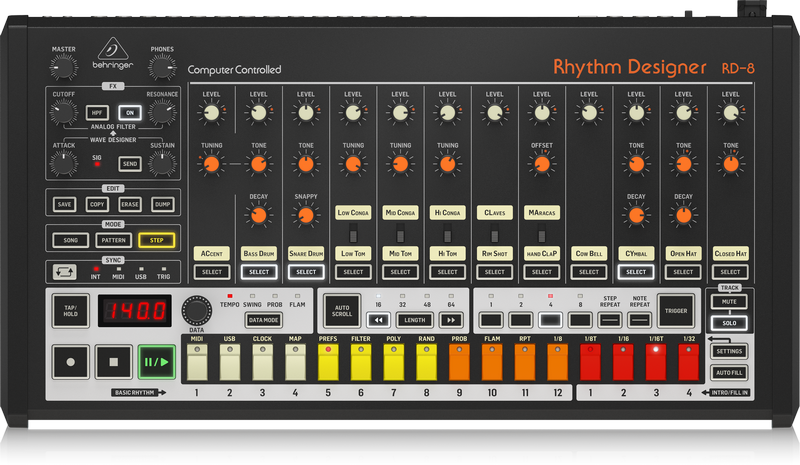
Based on: Roland TR-808 (1980, and not, sadly, the Soviet rocket RD-8)
List/street: $524.99 / $400
New features: What Behringer added here mostly was in the sequencer, which like the other remakes has some more advanced features. There’s also a sort of envelope follower called the Wave Designer.
The competition: Arturia’s DrumBrute Impact is actually cheaper, at around $300. It’s got fewer outs, but an advanced sequencer and a distinctive sound. Roland’s TR-8S or even a used buy on a TR-8 give you faders and additional effects (plus on the TR-8S, the ability to load your own samples), and could still be a worthy upgrade – with effective TR modeled sounds. Roland’s Boutique TR-08 on the other hand looks comparatively lean versus the Behringer, and it’d be nice to see the company that made the original 808 respond with something more competitive at the entry level. You can have my TR-8S when you pry it out of my cold, d– actually, my hot, sweaty, fader tweaking fingers.
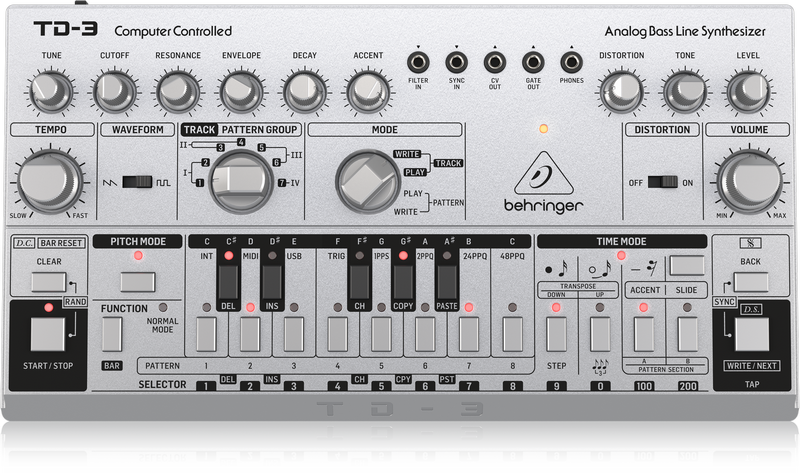
Based on: Roland TB-303 (1981)
List/street: $224.99 / $150
New features: The arpeggiator is the main addition here, plus a distortion switch, but basically this is a bare-bones 303 clone – at an insanely cheap price.
The competition: There are loads of 303 remakes out there, analog and digital. Roland for their part has the Boutique with a very useful delay and semi-useful distortion (theirs with an actual knob, not just a switch). But to my knowledge, the only real competition at this price is a software plug-in. Or get a KORG volca series synth for a different sound; even the volca bass is somewhat refreshingly not a 303. Oh yeah, or think about a two-oscillator bass synth, but I’m biased. Yes, of all of these – here is the one where Behringer can be expected to totally own a category, maybe to the point of us winding up with way too many acid tracks in about a year.
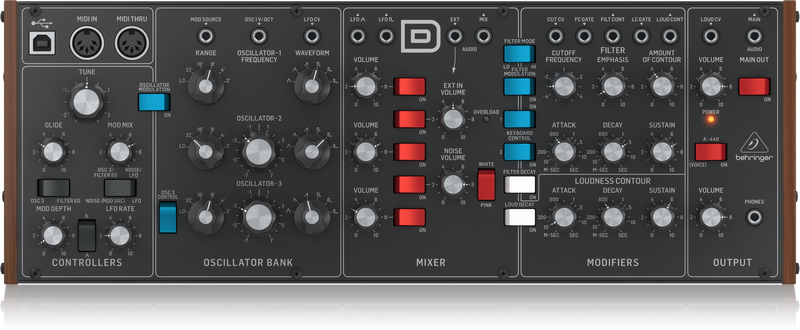
Based on: Moog Minimoog (1970)
List/street: $449.99 / $300
New features: As with the others, this is mostly about squeezing this in the Eurorack chassis, but there’s also a new overdrive circuit. Just remember, like the original, you have to give the analog circuits time to warm up.
The competition: You can get a surprising number of capable synths these days for $300 or even less, but a Minimoog remake from Moog will certainly be a luxury item. That said, if you’re willing to spend a little more, you can get something like the Moog Sub Phatty for around $500 on a Black Friday sale – with keyboard. It’s not a Minimoog model D, but it also moves into some new sonic territory, and you get the feeling of owning an actual Moog. That’s not to sneeze at the Model D – this thing has made a big impact, and maybe its biggest competition comes from Behringer itself, with the also inexpensive (and far more patchable/open-ended) Neutron. (Alternatively, get a true-polyphonic Minimoog Model D by using the official Moog iPad app – as a reasonably high-spec iPad with app will still likely cost less than this.)
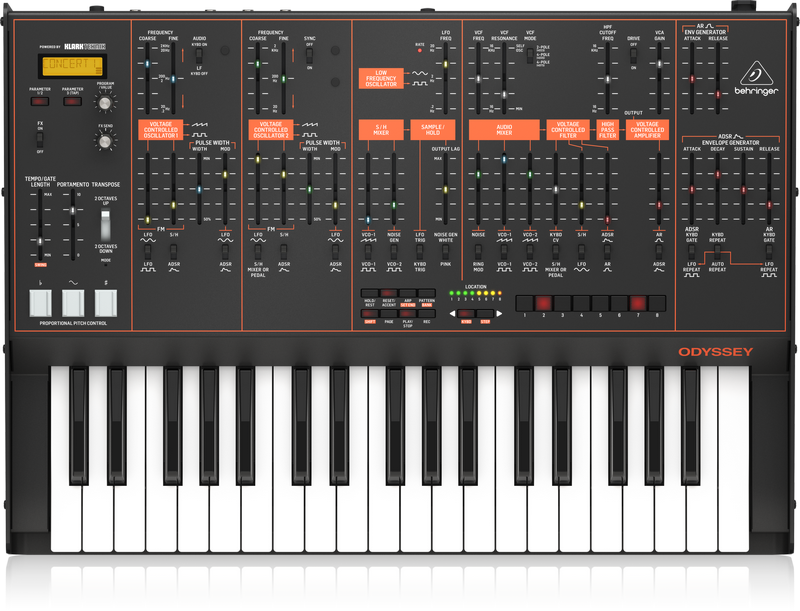
Based on: ARP Odyssey (1972)
List/street: $749.99 / $600
New features: Digital multi-effects are the main edition here, plus the arp/sequencer and onboard storage and digital I/O on the others. The Odyssey is also a keyboard synth, unlike the other Eurorack things in this list —
Competition: – but it goes up against KORG’s Arp Odyssey reissue, made in collaboration with the synth’s original creators (if at a higher cost).
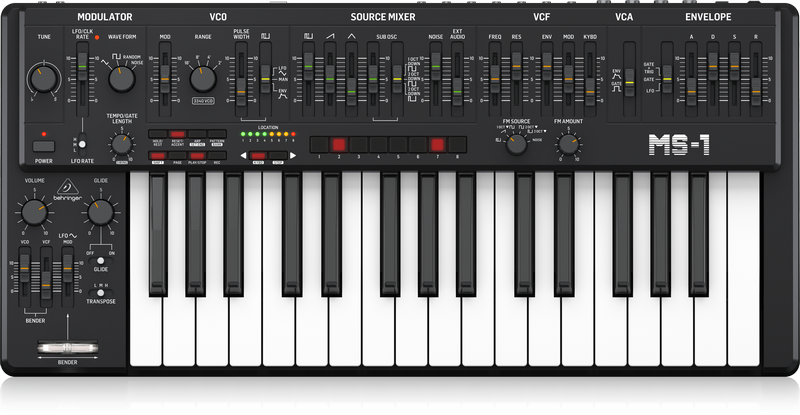
Based on: Roland SH-101 (1982)
List/street: $494.99 / $400
New features: These are the most sensible additions of the bunch. Behringer chose to add the thing the 101 owners modded themselves; namely, FM and waveforms (plus MIDI, of course). Actually, that begs the question of why Behringer didn’t add the 303 sound mods to that remake, but – hey, maybe someone else also wants to remake the 303 now, too? I’m sure 303 remakes will never die.
The competition: Behringer on this one did what Roland didn’t do – make a remake of the 101 with full-sized keys and a standard handle option for keytar-style playing. Roland chose to go with the tiny Boutique format. On the other hand, the SH-01A is a four-voice instrument, which winds up being really useful in conjunction with its triggers and sequencer. Now if Roland would just offer that in a full-sized keytar option, it seems like they’d have a hit. I might still buy the SH-01A for something small and four voice, though. (Don’t send letters. I know I like small things and digital synths more than some of our … readers. Ahem.)
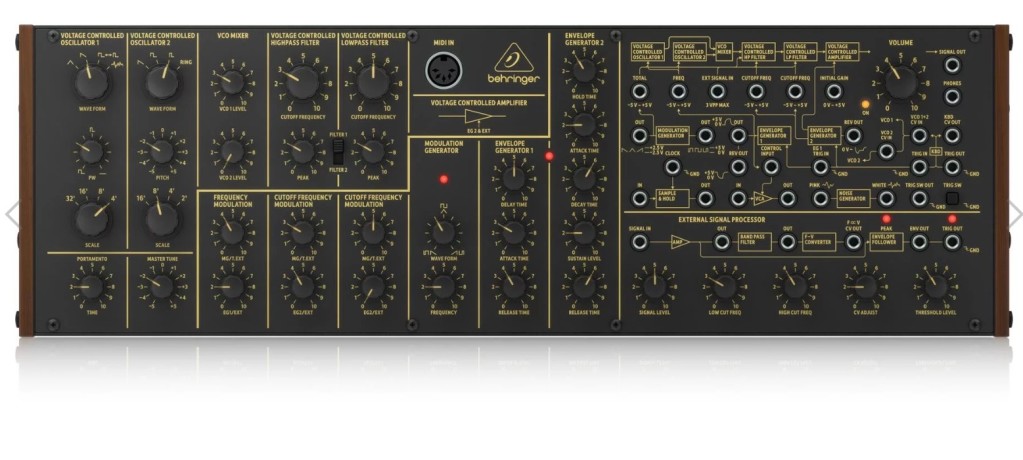
Based on: KORG MS-20 (1978)
List/street: Unpublished / $400
New features: This is basically a compact version of the MS-20, with USB and MIDI. Done. But there’s not another offering quite like that on the market; KORG’s MS-20 remake (with keyboard) will cost you more than four hundred bucks.
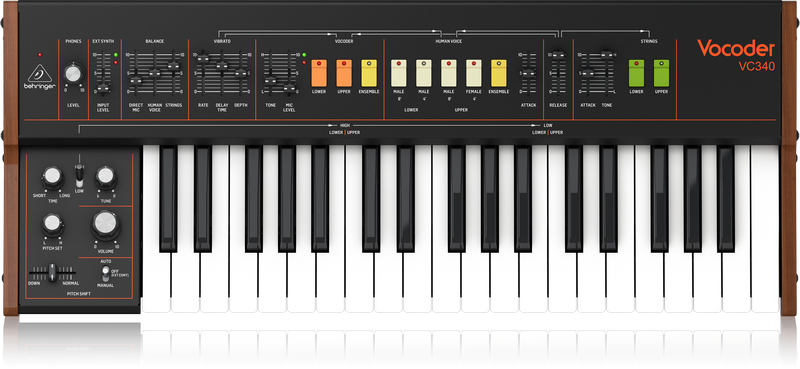
Based on: Roland VP-330 (1979)
List/street: $899.99 / $700
New features: Just the usual I/O additions – and they cut off an octave on the keyboard to save space.
The competition: For once, Behringer is the more expensive option, believe it or not (apart from an astronomically pricey original VP-330). The Roland Boutique VP-03 is a solid unit at a fraction of this price – it seems new hardware stock is mostly gone, but they fetch around $300 used (without the keyboard, so around $400 with). Sure, it’s digital, but the sound is good; mainly it’s down to whether you want to save some money. Roland’s JD-Xi is also a vocoder for $500 and is a far more flexible and powerful synthesizer, though the design has all the charm of something it looks like you’d find on sale in a Guitar Center on the Death Star. (Dunno, maybe Kylo Ren had this keyboard in the emo rock band he played on the side while studying the Dark Side.)
If all you want is a vocoder, even the Roland VT-4 box is an option for only a couple hundred bucks; its predecessor the VT-3 you might be able to get used, like, for free. Now, maybe an analog recreation is more serious but… well, I leave it to you to decide how serious you want to get about a vocoder/string synth unitasker. But yes, Behringer are the only ones with something really like the original.
For that reason, this is kind of the most rational of a lot of the choices here. But it’s a vocoder/string synth, so “rational” depends on whether that’s something you need.
Further out – clones inbound
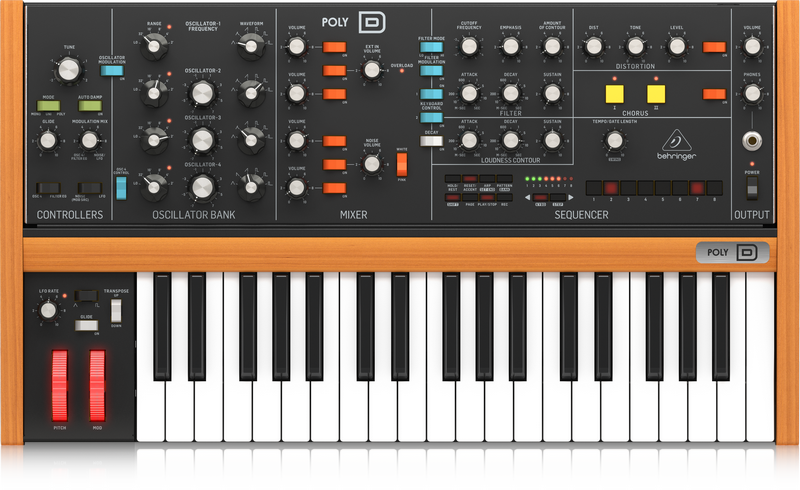
Based on: Behringer Model D, basically
Price: 699€ preorder on Thomann / other pricing unknown
Shipping date: unknown
New features: This is what happens if you take the Model D, put it in a new case with a keyboard, and make it 4-voice analog paraphonic (there’s just one filter) instead of monophonic. And it probably tips Behringer’s hand as far as what you should expect from the other models here – they’ll gradually translate the Eurorack-case monophonic models to updated hardware with keyboards and extra features, since they’ve already plucked the low-hanging fruit of what people most recognize in vintage brands.
In this case, they’ve also beefed up the I/O options, and you can switch between poly (technically para, but sure), unison, and mono.
As with past Behringer outings, though, they’re teasing some time before they’re shipping. The risk: people might defer purchase of their products. The more likely outcome: people might defer purchase of competing products.
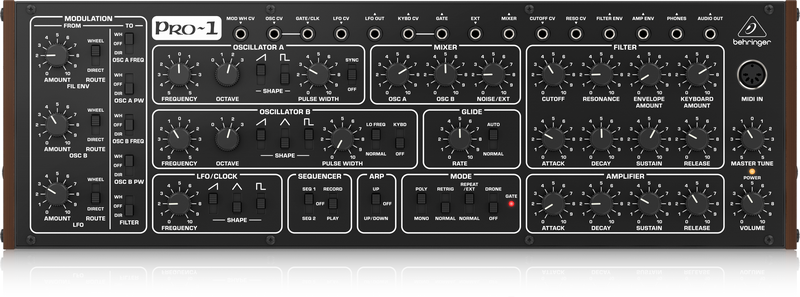
Based on: Sequential Circuits Pro-One
Preorder price: $350
Shipping date: unknown
New features: Arp, sequencer, Eurorack chassis – you’re seeing the pattern. There’s also a “drone mode” switch.
The competition: It’s a bit painful when Behringer takes on small, independent makers like Dave Smith and Tom Oberheim. The new Sequential (formerly Dave Smith Instruments) has lots of beautiful new designs. But if you’re on a $350 budget, you can get the wonderful Evolver or Tetra, for example, unique and original Dave Smith-designed sound modules. Or save up your money for a more advanced polysynth based on the ideas behind the Prophet series. Or there’s the Pioneer AS-1, which is a single-voice version of the Prophet-6. I think these come closer to the 21st century vision Dave’s got, and they’re worth supporting for that reason. Oh yeah, and you can buy them now, rather than waiting on the PRO-1.
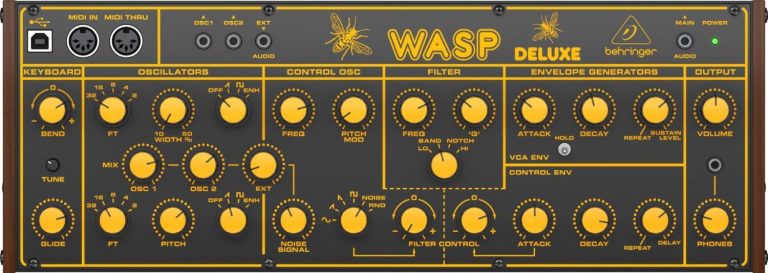
Behringer WASP DELUXE
Based on: Electronic Dream Plant (EDP) Wasp (1978)
Preorder price: $300
Shipping date: unknown
New features: Behringer went with a desktop sound module and didn’t reproduce the membrane keyboard edition of the first Wasp. This otherwise mostly looks like that hardware, though. It does MIDI and USB now, like the other stuff here.
The competition: You shouldn’t buy this, actually – because there’s a cute little kit that also does a Wasp-style keyboard. And you want that. So, get handy with a soldering iron, and buy this instead: the Jasper DIY kit from the UK.
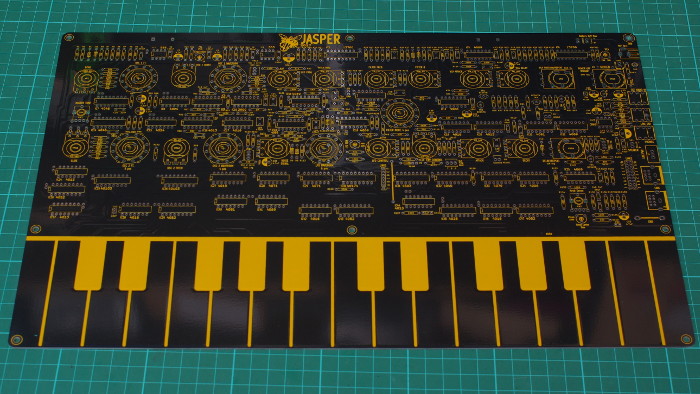
On the other hand, the Arturia MicroFreak is also a digital-analog hybrid, does way more in sounds, and comes with an innovative keyboard, so to me it’s a better (and more forward-thinking) use of your $300. There’s also the feature-packed Behringer Crave for $50 less than the not-yet-shipping Wasp remake, available now, so it’s hard to imagine preordering unless you’re really a die-hard fan of the original.
Check the history of the original, though; there were tons of interesting variations.
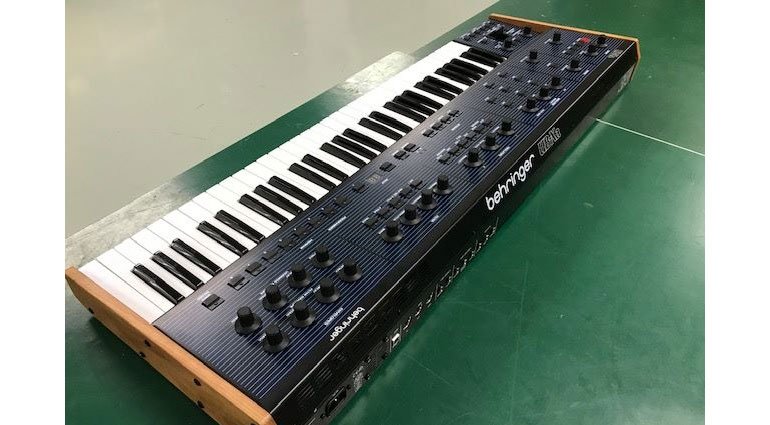
Behringer UB-Xa
Based on: Oberheim OB-X (1979)
Status: Unknown
I’m not sure we’ve had any news of this one since it showed up at Superbooth in the spring? Anyone?
And the rest…
If you’re KORG, Roland, Polivoks, Black Corporation (maybe their CS-80 Deckard’s Dream, maybe Kimiji) … it seems like Behringer is coming for you, or wants to. See previously:
Also, now they want to get into VST plug-ins?
(Comments on that last one are hilarious.)
Fear of clones?
It’s clear at this point that the Music Tribe (Behringer) is leveraging both analog circuitry and some chips that allow it to inexpensively reproduce popular models. And they’ve built a bigger team to do engineering alongside their own manufacturing operation in China. I think they’ve even taken to using the word “clone” in passing on social media.
Because these are now clones of fairly ancient products, this product strategy in itself wouldn’t make the company controversial. Rather, it’s Behringer’s aggressive strategy in regards to competitors, press, PR, and intellectual property that have made it divisive in the synth business. As I noted last week, that includes the recent move of registering trademarks actively owned by competitors. Not only does KORG definitely own and actively use Mono/Poly, but we’ve confirmed even the Polivoks name is registered and used on an active product.
There’s also a deeper question here, and it’s not just about Behringer. As both analog and digital synthesis has become more affordable, will we use that inexpensive power to make new things, or recreate old ones? So far, Behringer has demonstrated that recognized products like the 303, 808, and Minimoog go more viral in social media than new synths. And so far, companies like Roland and other original brands who made this products haven’t succeeded in stopping Behringer from naming and dressing up their products to look like the vintage products. That opens the door to even other manufacturers easily undercutting historic brands and smaller boutique makers on price.
But it’s unclear, once synth fans have stocked up on well-known items like the 303, whether this cheap remake trend will be sustainable.
In the meantime, back to new things.
Oh and — kill / bang / marry? Kill the TD-3 (sorry, enough acid), bang the Poly D, skip all the clones and marry the Neutron, if you have to get a Behringer. It’s the Neutron that people are actually hanging onto, of the current range. Alternatively, bang the Neutron and marry the Poly D.
The most interesting sub-$300 synths right now remain the KORG volca series (particularly the bonkers newest additions) and the Arturia MicroFreak (though you should buy an actual Mutable Instruments module to go with it).
No one can say, though, you can’t get a synth on a budget – you’ve got multiple choices from multiple vendors.